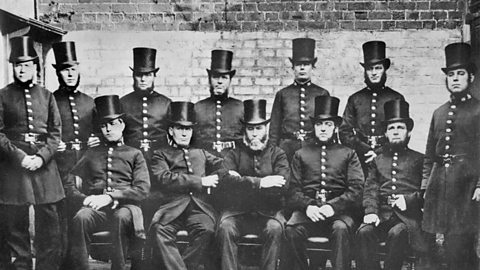The extension of police forces in the 19th century
By the start of the 19th century, there was increasing support for the concept of a professional, state-funded, full-time police force. Sir Robert Peel, the Home Secretary, supported the idea of the government taking responsibility for organising policing. However, the idea was still very controversial.
The growing need for police forces
Peel argued that because the crime rate was rising, especially in the industrial towns and London, a change in policing was needed. People were increasingly aware that most of the existing methods of catching criminals - used by the Justice of the Peace Someone responsible for maintaining law and order in a county. Often abbreviated to JP. constables and Charlies - were not effective. This was particularly the case in light of the massive industrial, agricultural and population changes that were taking place at the time.
The growth of popular protest convinced many that a professional police force was required. Events such as the Peterloo Massacre in 1819 showed the weaknesses of relying on the army to deal with public protests.
However, many people were opposed to the idea of a state-run police force as they believed it would threaten freedom. Some thought the government would use the police to compel people to do what they wanted. This had been seen in other European countries. People thought the police would be 'busy-bodies' and would pry into peopleÔÇÖs business. However, the main opposition was related to the increased tax that would be required to pay for the police force.
Acts passed to extend policing in the 19th century
The 1829 Metropolitan Police Act set up the Metropolitan Police in central London. Two commissioners were appointed to set up and run the new police force. Around 3,200 men were recruited to be full-time, trained, paid policemen. Many of the new constables were ex-soldiers. The numbers quickly grew and by 1882 there were 11,700 men in the Metropolitan Police. They became known as ÔÇÿPeelersÔÇÖ after Sir Robert Peel.

The success of the Metropolitan Police led to the idea of a police force being extended within London and across the whole of England and Wales. Several further acts were passed:
| Act | Development |
| 1839 Metropolitan Police Act | Extended the area covered by the Metropolitan Police to a 15-mile radius from the centre of London. |
| 1835 Municipal Corporations Act | Gave towns outside London the power to set up their own police force if they wanted to. However, by 1837, only 93 out of 171 towns had done this. |
| 1839 County Police Act (also known as the Rural Police Act) | Gave Justices of the Peace in each county the power to set up their own police force. Doing so was not compulsory and only 55 forces had been set up by 1856. |
| 1856 County and Borough Police Act | Made it compulsory for all towns and counties in England and Wales to set up a full-time, paid police force. |
| Act | 1839 Metropolitan Police Act |
|---|---|
| Development | Extended the area covered by the Metropolitan Police to a 15-mile radius from the centre of London. |
| Act | 1835 Municipal Corporations Act |
|---|---|
| Development | Gave towns outside London the power to set up their own police force if they wanted to. However, by 1837, only 93 out of 171 towns had done this. |
| Act | 1839 County Police Act (also known as the Rural Police Act) |
|---|---|
| Development | Gave Justices of the Peace in each county the power to set up their own police force. Doing so was not compulsory and only 55 forces had been set up by 1856. |
| Act | 1856 County and Borough Police Act |
|---|---|
| Development | Made it compulsory for all towns and counties in England and Wales to set up a full-time, paid police force. |
Each area set up their own force on the same lines as the Metropolitan Police.
The methods of the new police forces
At first, all of the new police forces consisted of ordinary constables and inspectors. Constables were expected to be young men, be over 5ÔÇ▓7ÔÇ│ tall, and be able to read and write. They worked seven days a week and spent their time ÔÇÿwalking the beatÔÇÖ - a specific patrol area - on foot.
At first there was a lot of opposition to the new police forces, especially in poorer, working-class areas, such as the East End of London. Across the country there was resentment of the increased taxation required to fund the police.
In some slum areas, the police still had difficulty winning over the local population. and it took a number of years to overcome local resistance.